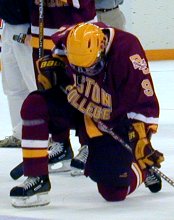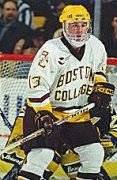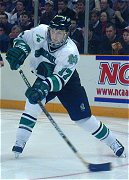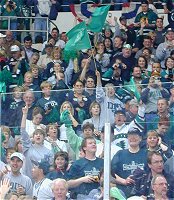It was March 1998, and St. Lawrence was staring at elimination from the ECAC tournament, a dubious distinction when 10 of 12 teams make it.
After being a national contender for years, the Saints spent most of the ’90s in the lower tier of the ECAC standings. They thought they were close to turning things around, but 1998 was another year near the bottom.
Now, needing two wins in the final weekend to make the playoffs, St. Lawrence found itself tied late in overtime against Cornell. With the season in the balance, then-freshman Erik Anderson won a faceoff back to the point, and John Poapst teed up a shot that whistled in with one second remaining in overtime.
St. Lawrence went on to win the next night, make the playoffs, and give first-place Yale a run for its money.
From seemingly innocent seeds come amazing fruits. Two years later, St. Lawrence coach Joe Marsh, his program reborn and again a national contender, remembered years ago.
“It hit the water bottle. And it was probably one of the biggest goals ever scored in our program,” said Marsh. “We won the next night and got in the playoffs by the skin of our teeth in 10th place, and we went down and tied Yale the first two games in a best-of-3 series and lost the third game in a series we were so close to winning.
“I think right there, we got three playoff games under our belt, and the guys started to learn and understand, and got the taste of it, and that set the tone for last year.”
"I do think we can come back. Maybe I’ve learned a little more about what it takes to build a team like this, and I think I appreciate it more."
— Joe Marsh
Last year meant a second-place finish and an appearance in the ECAC tournament championship game against North Country neighbor Clarkson, followed by an NCAA tournament loss to Colorado College in the West Regional.
“To get to the finals and lose the [ECAC] championship game, that then set the tone for this year,” said Marsh.
This year meant a trip to the national semifinals for the first time since 1988.
There’s a sense that St. Lawrence has come full circle. But, by the same token, there’s a bigger sense that it is not done yet.
In 1988, St. Lawrence lost a heartbreaking overtime decision to Lake Superior in the finals at Lake Placid. This year, the Saints dropped an agonizing 4-2 game to Boston College in Providence on Thursday when Jeff Farkas scored with two minutes left.
But the differing aftertaste — or tone — of the two defeats, 12 years apart, is what allows Marsh to still feel good today despite the bitter disappointment of Thursday.
When St. Lawrence battled Lake Superior into overtime of the 1988 title game in Lake Placid before falling short, Marsh had a stocked team loaded up for one run at glory. This time around, however, there’s every reason to believe, just two notches up the mountain removed from the 1998 10th-place finish, that the Saints’ program can maintain these standards of excellence for years to come.
“In ’88, I was a lot younger, I had more hair, it was a different color, and I certainly was a lot stupider,” said Marsh, in the quick-witted, Boston-accented style all his own. “It was my third year as head coach and we came within an overtime goal of a national championship. We were loaded. We just felt we had every component at the right time. There was a karma there. We felt we had everything right there.”
St. Lawrence would have some more good years left, with players like Mike Lappin, Les Kuntar and Dan Laperriere, but the cupboard would run dry. Other teams caught up, and the Saints, unable to give scholarships, watched rival Clarkson and others soar past them.
Of course, it’s no coincidence that St. Lawrence’s revitalization coincides with the green light given by the administration to finally award scholarships.
“That year, 1988, might have hurt us, because the administration might have thought, ‘We’re doing well without scholarships,'” said Marsh.
“Having recruited for that team, I knew how difficult it was. We’re sort of a small market team. But I don’t feel that way anymore. I think college hockey has changed, the parity, the competitiveness.”
Marsh is not being cocky when he says he now believes his program can maintain a certain level of excellence, and return to the tournament again with a good chance to compete. He says it with a bit of tentative nervousness, but it’s simply a statement of reality, that his program is now on a level playing field with schools like Clarkson. It might still be in a small market, but it has plenty going for it, too.
“I do think we can come back,” said Marsh. “Maybe I’ve learned a little more about what it takes to build a team like this, and I think I appreciate it more.”
Some people believe granting scholarships means a school will recruit anyone as long as they could play hockey. But Marsh always knew there was an added obligation to find character kids, because the administration would further scrutinize the program.
“Scholarships have been a plus in many ways,” said Marsh. “It allows us to be more competitive and selective academically. The administration is pleased with the results. The best teams are often the best academically as well. This past semester they had a 2.95 grade point average.”
In that group is the Muir twins, Sean and Mike, from Needham, Mass., who both just finished their sophomore seasons. Marsh says they have run their own landscaping business since they were 13, and Sean was a recent St. Lawrence Freshman Scholar-Athlete of the Year award winner.
“We’re well-balanced and well-focused, on and off the ice,” said Marsh. “Long term is what were looking for. We want a kid we don’t have to baby sit for, who comes in and creates an agenda you can be successful with.”
Of course, it still has to be done on the ice. One of the nice residual effects from making it to the tournament, was the contacts Marsh made, which then helped compound the success.
“I’m really thankful to get into [the tournament] and get to know some of the other coaches better,” said Marsh. “A guy like Jeff Sauer offers us an opportunity to go and play in Wisconsin, and we lost and tied, and it was one of the best trips we’ve ever taken. At the time they were [ranked] first in the country, and we got a lot out of it.”
St. Lawrence was successful this season thanks to a well-rounded group, led by senior defensemen Dale Clarke and Justin Harney. The offense had five double-digit scorers, led by Alan Fyfe’s 17, but none with 20 goals.
But as with any successfully rejuvenated program, there are the unsung guys who laid the foundation along the way, guys who gave their all to the team but who may not have been around to see the fruits of their labor.
“We have people that have graduated like Bob Prier and Paul DiFrancesco that are still in that room in a way,” said Marsh. “They set a tone, set an agenda, that has affected a lot of the players when they were younger, like Clarke and Harney, and now they’ve passed it along. Success breeds success.”
The Saints lose just one regular forward from this year’s team, 13-goal scorer Jason Windle. His linemates, Fyfe and Erik Anderson, along with Mike Gellard and Brandon Dietrich will form a solid core.
But there’s also plenty of reinforcements on the way, most notably Russ Bartlett. Bartlett was the third-leading scorer for Boston University last year, but was unceremoniously cut from the team by BU coach Jack Parker before this season. Bartlett was stunned, but he recovered, came to St. Lawrence for his year-in-waiting, worked out with the team, and is ready for big things.
“I think he’s taken the high road,” said Marsh. “He’s come in and worked very hard. He’s had to battle the mental part of it, being in limbo.
“Jack [Parker] runs his team as he sees fit. I think Jack likes the kid a lot, but he went in a different direction. But there was never any bashing. I would never engage in something like that.
“[Bartlett’s] faster, he’s stronger, he might be so appreciative now. He’s not going to take anything for granted.”
Rich Peverly will be another addition to the frontline.
Marsh was also the beneficiary of some more good fortune when he landed defensemen Ryan Glenn (6-foot-3, 210 lbs.) and Jeremy Cormier (6-2, 205) from the Walpole Stars junior program. They were ticketed for UMass and Maine, respectively, at one point, until circumstances changed their decision. Both will be over 20 when joining the Saints, and will help at least to begin fill the void left by the departures of Harney, Clark and Josh LeRoy.
“Cormier is a big strong kid who can shoot it right through the boards,” said Marsh. “Glenn is a very dynamic player, aggressive, skilled and he competes like it’s World War III.”
Perhaps most importantly, Marsh will have Derek Gustafson in goal. The freshman emerged this season from a pack of three goalies, and will get a lot of preseason attention in 2000-01.
“Hopefully we can take the next step, but I’m a realist too,” said Marsh. “It will be pretty hard to replace No. 8 and 15 [Clarke and Harney]. But I definitely feel we have a better understanding of the process.”
Harney was the cornerstone for the Saints the last few seasons, and he can take pride in leaving the program in much better shape than when he arrived. He was a Boston-area kid whose brother was a captain for Boston College, but he chose St. Lawrence.
“Looking back, I wouldn’t have done it any other way,” said Harney. “I have absolutely no regrets at all, and I don’t think anyone on our team should have any regrets. My brother Joe played at BC. He was captain there in ’96. Obviously, things have to come to an end, and it’s tough to swallow right now, but I’m sure we’ll look back [fondly].”
Said Marsh, “To be involved in this tournament, and a classic game like we had against BU, it whets your appetite.
“I’m just glad they have something to show for the hard work. They can stick a banner up there in Appleton [Arena]. I guess we’ll even get them some rings, if we can dig up some money. Hopefully the alumni [are] still pretty happy.”



